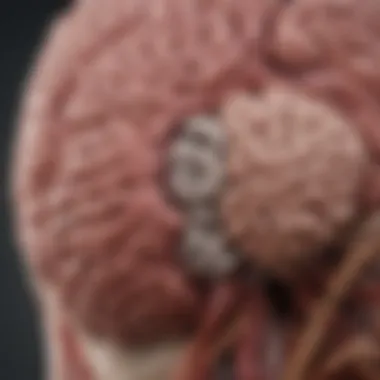Unlocking the Secrets to Gut Health: A Holistic Guide to Healing Your Gut


Well-Being Overview
In the realm of optimal health and holistic well-being, one crucial yet often overlooked aspect is the state of our gut health. The intricate ecosystem of our digestive system plays a vital role in our overall wellness, from immune function to nutrient absorption. Delving into the depths of healing your gut opens doors to a myriad of benefits directly impacting your vitality and energy levels.
Mental Health Matters
Understanding the symbiotic relationship between gut health and mental well-being unveils a profound aspect of holistic health. The intricate link between the gut and brain, known as the gut-brain axis, emphasizes the need to prioritize mental health in your wellness journey. Implementing mindfulness practices, stress-relief techniques, and fostering coping mechanisms for stress and anxiety are pivotal steps towards achieving overall well-being.
Physical Wellness
Embarking on a journey of gut healing necessitates acknowledging the role of physical wellness in this holistic process. Regular exercise routines tailored to your fitness level, coupled with mindful movement practices, not only aid in digestion but also contribute significantly to enhancing gut health. From maintaining healthy eating habits that promote gut-friendly foods to advocating for the importance of incorporating ample physical activity, prioritizing physical wellness is paramount in nurturing your gut.
Mindfulness & Self-Care Practices
Integrating mindfulness and self-care practices into your daily routine serves as a cornerstone in the realm of holistic gut healing. Embracing mindfulness techniques such as meditation, deep breathing exercises, and grounding practices fosters a profound connection between mind and body. Simultaneously, prioritizing self-care rituals aimed at rejuvenation, relaxation, and work-life balance is integral to ensuring sustainable well-being.
Nutrition for Nourishment
Nourishing your gut through a balanced and nutrient-rich diet forms the bedrock of gut healing. Understanding the benefits of consuming gut-friendly foods rich in probiotics and prebiotics provides a foundational understanding of the symbiotic relationship between nutrition and gut health. Implementing easy yet nutrient-dense recipes into your meal plans not only promotes digestive health but also supports overall well-being and vitality.
Introduction to Gut Health
Etching the foundational layer of our discourse on gut health, this section sheds light on the pivotal role of gut health in overall well-being. Understanding the intricate workings of our gut is essential for optimal health. The significance of gut health transcends mere digestion; it influences various aspects of our physiological and psychological health. Delving into this crucial topic sets the stage for a comprehensive exploration of strategies to enhance gut health.
The Significance of Gut Health
The Gut-Brain Connection
In the realm of gut health, the gut-brain connection stands out as a vital link between our enteric system and cognitive functions. This intricate connection highlights how the gut and brain communicate bidirectionally. The gut-brain axis influences mood, cognition, and behavior, underscoring its relevance in discussions revolving around gut health. Recognizing the influence of this connection accentuates the holistic approach required to optimize gut health and overall well-being.
Role of Gut Microbiome


The gut microbiome, comprising diverse microorganisms residing in our intestines, plays a fundamental role in maintaining gut health. These microorganisms aid in digestion, immunity, and metabolism, emphasizing their indispensable contribution to overall health. Understanding the pivotal role of the gut microbiome in orchestrating various physiological processes underscores its significance in the realm of gut health discussions. Nurturing a diverse and balanced gut microbiome is crucial for fostering optimal health.
Common Gut Health Issues
Leaky Gut Syndrome
Among the prevalent gut health issues, leaky gut syndrome draws attention for its impact on gut permeability. This condition involves the compromised integrity of the gut lining, allowing harmful substances to pass through and trigger immune responses. Recognizing the implications of leaky gut syndrome in gut health discussions underscores the need to address gut barrier function for overall well-being.
Irritable Bowel Syndrome
Irritable bowel syndrome (IBS) emerges as a common gastrointestinal disorder characterized by abdominal pain, bloating, and altered bowel habits. The multifaceted nature of IBS highlights the intricate interplay between gut function and individual symptoms. Exploring the nuances of IBS in the context of gut health underscores the importance of personalized approaches in managing gut-related issues. Addressing the underlying factors contributing to IBS is crucial for enhancing gut health and quality of life.
Factors Affecting Gut Health
In this article, a profound focus is placed on elucidating the critical role played by dietary influences, lifestyle choices, and environmental factors, and their consequential impact on gut health. Understanding these intricate elements is paramount in navigating the complexities of gut wellness. Factors affecting gut health not only determine the state of one's digestive system but also have far-reaching effects on overall health and well-being. By delving into these factors, readers can gain valuable insights into optimizing their gut health journey.
Dietary Influences
Impact of Processed Foods
An insightful examination into the intricate dynamics of processed foods unveils their significant contribution to gut health. Processed foods, known for their convenience and availability, often lack essential nutrients and fiber vital for a healthy gut. The ubiquitous nature of processed foods in modern diets necessitates a closer look at their impact on gut microbiota and digestive processes. While indulging in processed foods may offer convenience, their long-term effects on gut health can be detrimental, emphasizing the importance of mindful consumption and moderation.
Role of Fiber
Fiber emerges as a cornerstone in promoting gut health due to its diverse benefits and functional properties. Adequate fiber intake supports digestive health by aiding in regular bowel movements and fostering a balanced gut microbiome. Its ability to regulate blood sugar levels and promote satiety underscores its significance in maintaining overall health. Integrating fiber-rich foods into daily meals not only supports gut motility but also contributes to long-term well-being, highlighting the indispensable role of fiber in optimizing gut health.
Lifestyle Choices
Stress and Gut Health
The intricate interplay between stress and gut health underscores the pivotal role of lifestyle choices in gut well-being. Chronic stress can disrupt the delicate balance of gut microbiota and compromise digestive function, leading to a cascade of health issues. Implementing stress management techniques such as mindfulness, meditation, and relaxation practices is essential in nurturing a healthy gut environment. By acknowledging the profound impact of stress on gut health, individuals can take proactive steps towards cultivating resilience and promoting overall well-being.
Sleep Patterns


Optimal sleep patterns play a crucial role in supporting gut health and overall physiological function. Disrupted sleep can impair digestive processes, alter hunger hormones, and negatively impact gut microbiota composition. Prioritizing adequate sleep duration and quality is imperative in fostering a harmonious gut-brain axis and optimizing metabolic function. Individuals committed to enhancing their gut health must prioritize healthy sleep patterns as a fundamental component of holistic well-being.
Environmental Factors
Effects of Pollution
The pervasive effects of pollution on gut health illuminate the intricate relationship between environmental factors and metabolic well-being. Exposure to pollutants, toxins, and environmental contaminants can disrupt gut microbiota equilibrium, compromising immune function and inflammatory responses. Understanding the detrimental effects of pollution on gut health underscores the urgency of adopting sustainable practices and advocating for environmental stewardship. Mitigating exposure to pollutants through conscious lifestyle choices can safeguard gut integrity and promote long-term health.
Importance of Probiotics
Probiotics emerge as indispensable allies in nurturing a flourishing gut ecosystem and bolstering immune function. These beneficial bacteria play a pivotal role in maintaining gut microbial diversity, enhancing nutrient absorption, and mitigating inflammation. Incorporating probiotic-rich foods and supplements into daily dietary regimens can fortify gut health and support overall vitality. Recognizing the significance of probiotics in optimizing gut health empowers individuals to make informed choices that prioritize microbial balance and digestive wellness.
Improving Gut Health Naturally
Gut health plays a crucial role in overall well-being, and improving it naturally is a key focus of this comprehensive guide. By addressing gut health through natural means, individuals can achieve lasting benefits that contribute to their holistic wellness journey. The encompassing nature of natural gut health improvement methods ensures a sustainable approach to enhancing digestion, immunity, and overall health. Through emphasizing natural solutions, individuals can cultivate a healthy internal environment that fosters optimal functioning.
Nutritional Approaches
Nutritional approaches are fundamental in nurturing gut health naturally, with a specific emphasis on incorporating fermented foods and consuming prebiotic-rich foods.
Incorporating Fermented Foods
Incorporating fermented foods introduces beneficial probiotics into the gut, supporting a healthy balance of gut bacteria. Fermented foods like kimchi, kefir, and sauerkraut undergo a fermentation process that enhances their probiotic content. These probiotics aid in digestion, nutrient absorption, and immune function, promoting overall gut health. The fermentation process also generates beneficial enzymes and B vitamins, further supporting gut health. Including a variety of fermented foods in the diet can diversify the gut microbiome, leading to improved gut function and overall well-being.
Consuming Prebiotic-Rich Foods
Consuming prebiotic-rich foods is equally essential in nurturing gut health naturally. Prebiotics are non-digestible fibers that act as food for beneficial gut bacteria, stimulating their growth and activity. Foods like chicory root, garlic, onions, and bananas are rich sources of prebiotics. By incorporating prebiotic-rich foods into the diet, individuals support the growth of beneficial bacteria in the gut, promoting a healthy gut microbiome. Prebiotics also aid in regulating digestion, improving nutrient absorption, and enhancing overall gut health. Including a variety of prebiotic-rich foods in daily meals can optimize gut health and support digestive well-being.
Lifestyle Modifications
Apart from nutritional approaches, certain lifestyle modifications are integral to naturally improving gut health, focusing on regular exercise and mindful eating practices.


Regular Exercise
Regular exercise plays a significant role in enhancing gut health naturally. Physical activity contributes to improved digestion, reduced inflammation, and enhanced gut motility. Exercise has been shown to promote a healthy gut microbiome by increasing microbial diversity and promoting the growth of beneficial bacteria. Engaging in routine physical activity not only supports gut health but also boosts overall well-being, creating a positive impact on various aspects of health.
Mindful Eating Practices
Practicing mindful eating is a key aspect of improving gut health naturally. Mindful eating involves paying attention to the sensory experience of eating, including taste, texture, and aroma. By practicing mindful eating, individuals can enhance digestion, prevent overeating, and promote mindful food choices. Being present while eating allows individuals to better recognize hunger cues, appreciate food flavors, and make conscious decisions about dietary intake. Incorporating mindful eating practices into daily routines can support gut health by promoting healthy eating habits, responsible food selection, and overall well-being.
Seeking Professional Guidance
Seeking professional guidance is a crucial aspect discussed in this comprehensive guide to healing your gut. When it comes to gut health, consulting with healthcare providers can offer invaluable insights and personalized recommendations tailored to individual needs. Professionals play an essential role in guiding individuals towards optimal well-being by addressing specific concerns and providing evidence-based strategies.
Consulting Healthcare Providers
Nutritionists and Dietitians
Nutritionists and dietitians bring a specialized focus on dietary interventions crucial for gut health. Their expertise in creating balanced meal plans and recommending gut-friendly foods can significantly impact digestive wellness. By emphasizing nutrient-rich choices and personalized nutrition strategies, these professionals aid in optimizing gut function. The key characteristic of nutritionists and dietitians lies in their ability to translate complex nutritional science into practical dietary advice, making them a preferred choice for addressing gut health.
On the flip side, while nutritionists and dietitians provide tailored nutrition plans, potential disadvantages may include the variation in expertise levels within the field, leading to differences in the quality of advice offered. Nonetheless, their significance in promoting gut health cannot be overlooked due to their unique insight into the impact of food on digestive processes.
Gastroenterologists
Gastroenterologists play a pivotal role in addressing complex gut health issues through medical interventions and specialized treatment plans. With a focus on gastrointestinal disorders, they bring a wealth of diagnostic tools and medical knowledge to the table. Their key characteristic lies in their in-depth understanding of digestive system functioning, enabling them to diagnose and treat gut-related conditions effectively.
While seeking guidance from gastroenterologists offers advanced medical perspectives, some potential drawbacks may include the necessity of medical interventions and potential risks associated with certain treatments. Despite these considerations, the expertise and specialization of gastroenterologists make them a valuable choice for those grappling with severe gut health challenges.
Conclusion
In the realm of gut health, the conclusion serves as a pivotal point in this comprehensive guide. It encapsulates the essence of empowering your gut health journey by highlighting the significance of consistency and mindfulness. Consistency, as discussed throughout this article, plays a fundamental role in achieving optimal gut health. By maintaining consistent healthy habits, individuals can cultivate a balanced gut microbiome and promote overall well-being effectively. Moreover, listening to your body emerges as a crucial aspect in enhancing gut health. Understanding your body's signals and responses allows for personalized interventions that cater to individual needs. This article underscores the importance of embracing these principles in sustaining long-term gut health improvements.
Empowering Your Gut Health Journey
Consistency is Key
Delving into the core of gut health empowerment, consistency stands out as a fundamental principle to anchor one's journey towards holistic well-being. The essence of consistency lies in the persistent cultivation of healthy habits that support gut function and overall health. Consistency entails adhering to a balanced diet rich in fiber and fermented foods, practicing regular exercise, prioritizing quality sleep, and maintaining mindfulness in eating habits. This steadfast commitment to health-promoting behaviors ensures the resilience of the gut microbiome, fostering a harmonious gut environment conducive to well-being. The unique feature of consistency lies in its ability to lay a solid foundation for sustainable gut health improvements, providing a roadmap for individuals to navigate their well-being with steadfast dedication.
Listen to Your Body
Within the tapestry of gut health empowerment, the practice of listening to your body emerges as a pivotal strategy for optimizing health outcomes. By attentively tuning in to the signals and cues of your body, individuals can gain valuable insights into the impact of their dietary and lifestyle choices on gut health. Listening to your body involves honoring hunger and satiety cues, recognizing food intolerances or sensitivities, and acknowledging stress-induced responses that influence gut function. The key characteristic of listening to your body lies in its personalized approach to health optimization, allowing individuals to tailor their wellness journey according to their unique physiological needs. This practice fosters a deeper connection with one's body and empowers individuals to make informed choices that nurture gut health and overall well-being.



